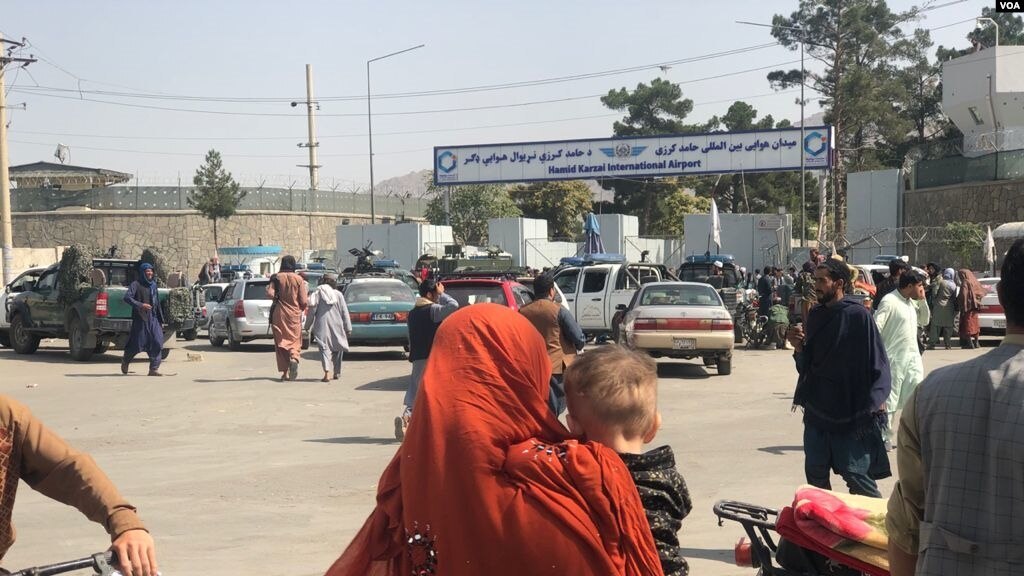
(Wikimedia Commons/Zoozaz1) Crowds of people in front of Kabul airport, trying to travel abroad.
Throughout history, the achievements of certain American presidents have been overshadowed by scandals or catastrophic policy mistakes. Bill Clinton may have brokered peace between Israel and Jordan, but he is remembered for his affair with Monica Lewinsky. George W. Bush may have initiated the No Child Left Behind Act, which aimed to increase federal funding for low-income schools, but his presidency has been defined by his egregious mishandling of the Iraq war.
Even though I support President Biden and will almost certainly vote for him again should he run for reelection, his decision to withdraw all U.S. troops from Afghanistan may be a blunder that will eclipse his successes.
In October 2001, the U.S. sent troops to Afghanistan because its governing authority, the Taliban, was harbouring Osama Bin Laden and other Al Qaeda operatives who used the country as a safe haven to plan the 9/11 attacks. That’s why most public officials backed the war effort at the time, including former President Barack Obama who labeled the invasion as “fundamental to the defense of our people.”
Although the U.S. military ousted the Taliban and drove most of these virulent groups out of Afghanistan shortly after its initial invasion, there is little reason to believe that Al Qaeda will not return now that U.S. troops have left.
The Taliban may have agreed to quash terrorist activity as part of its agreement with the Trump administration, but many proponents of the U.S. intelligence community do not trust the Taliban to keep their word. In fact, most have expressed fear that fully withdrawing troops this month will allow Afghanistan to reemerge as the pernicious jihadist enclave it once was, rendering the American people vulnerable to a national security nadir similar to 9/11.
To be sure, the dangers incurred by the withdrawal extend far beyond the burden it imposes on those living in the west. If anything, Afghan citizens will fare much worse than Americans who will not live under a brutal Talibanic theocracy. The Taliban has already overcome the reformist Ghani-led government and most expect the incoming regime to enforce a stringent interpretation of Sharia law, which includes amputation as a punishment for theft.
Yet, while the Taliban’s takeover is heart-wrenching, the Afghanistan war is not a nation-building operation and we shouldn’t maintain a military presence in the country solely to protect Afghan natives. There are many illiberal regimes in the world. It is not the U.S. ‘s duty, nor is it within the U.S.’s capacity, to police all of them. In February of last year, President Biden lamented that the nation cannot “solve every single internal problem around the world.” I generally agree with this premise, though I don’t believe it is applicable to Afghanistan.
We didn’t send troops to the country merely to unseat the brutal Taliban and safeguard the human rights of Afghan citizens. Instead, to slightly paraphrase Obama, the war is and has been “fundamental to the defense of our people” and it will be American citizens — not just Afghans — who will suffer as a consequence of the full withdrawal.
When the Trump administration initially announced plans to withdraw all U.S. troops in May 2020 (he bears as much, if not more, responsibility for this fiasco as his successor), he attempted to pacify national security concerns by vowing to attack terrorist bases in Afghanistan without troops on the ground.
There is one problem with this aspiration: Afghanistan is landlocked. In countries like Syria and Yemen, the U.S. and its coalition partners can feasibly strike targets along stretched coastlines. However, Afghanistan’s most dangerous areas are more than 700 miles from the ocean, deep in valleys only penetrable from bases inside the country or neighbouring countries like Pakistan that have refused to accommodate a U.S. military presence.
Former U.S. Army vice chief of staff Jack Keane puts it most succinctly, “Giving up those bases means giving up much needed and largely successful operations against those (terrorist) groups.” Despite being told this for months, President Biden and his defense secretary have decided to go against the grain and unwittingly hand a victory to the aggressors that seek to harm us.
To be clear, I live under no illusion of the human and economic costs associated with war. In fact, I often agree with progressive critiques of American foreign policy. The U.S. has involved itself in too many morally bankrupt and superfluous conflicts abroad, resulting in great loss of life and funds that could have been diverted to needed domestic projects. Nevertheless, the cost of keeping a residual force on the ground is minimal and a wise investment given the alternative.
The few thousand troops needed to fight Al Qaeda would not only represent a minuscule fraction of the federal budget, but casualties would almost certainly remain extremely low. Moreover, while I mourn every heroic soldier killed in combat, putting themselves in harm’s way to protect the American populace and our allies is a job they volunteer to do. It’s a job that they’ve carried out gallantly and effectively in Afghanistan over the past two decades.
President Biden is squandering the sacrifice of these soldiers, abandoning the Afghans who counted on the U.S. and unnecessarily risking the lives of the American people through this impulsive decision. It is he, along with his predecessor, who will stand in the dock of history as responsible for the bloodshed to come.
Joe Beare (23C) is from London, England.
Joe Beare (23C) is from London, majoring in political science and history. Beare is a player on the Emory men’s soccer team and enjoys reading, discussing politics and watching soccer with his friends. He intends to go to law school and run for elected office in the U.S.


